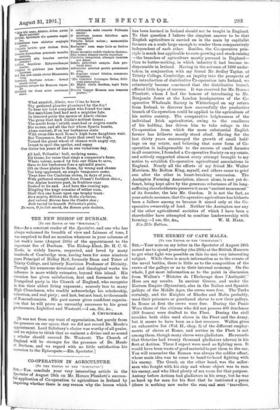CO-OPERATION DT AGRICULTURE.
[To ran EDITOR. OF THE 'SPECTATOR:1
SIR,—You conclude your very interesting article in the Spectator of August 24th on Mr. Horace Plunkett's success- ful application of Co-operation to agriculture in Ireland by inquiring whether there is any reason why the lesson which has been learned in Ireland should not be taught in England. To that question I believe the simplest answer to be that English agriculture is carried on in the main by capitalist farmers on a scale large enough to render them comparatively independent of each other. Besides. the Co-operative prin- ciple is much less applicable to corn-growing and stock-raising —the branches of agriculture mostly pursued in England— than to butter-making, in which industry it had become in- dispensable in Ireland. Having in the autumn of 1888 under- taken, in conjunction with my friend Mr. Sedley Taylor, of Trinity College, Cambridge, an inquiry into the prospects of the introduction of distributive no-operation into Ireland, we reluctantly became convinced that the distributive branch offered little hope of success. It was reserved for Mr. Horace Plunkett, whom I had the honour of introducing to Mr. Benjamin Jones at the London headquarters of the CC- operative Wholesale Society in Whitechapel on my return from Ireland, to discover how successfully the productive branch of Co-operation could be applied to the agriculture of his native country. The comparative helplessness of the individual Irish agricultulist, owing to the smallness of his holding, has driven him to take refuge in the Co-operation from which the more substantial English farmer has hitherto mostly stood aloof. Having for the last thirty years encouraged the growth of small hold- ings on my estate, and believing that some form of Co- operation is indispensable to the success of small farmergs in all countries, I founded a Co-operative Society on my estate,' and actively supported almost every attempt brought to my notice to establish Co-operative agricultural associations in England. Nearly all the efforts of my friend Mr. Walter Morrison, Mr. Bolton King, myself, and others came to grief one after the other in heart-breaking succession. The Assington Farming Association, almost alone, is not yet de- funct, being kept alive by the generous reluctance of its long- suffering shareholders to preserve it as an " ancient monument" of its founder, the late Mr. Gurdon. It is not the fact, as your article assumes, that Co-operative agriculture has hitherto been a failure among us because it aimed only at the Co. operative ownership of land. Neither the Assington nor any of the other agricultural societies of which I have been a shareholder have attempted to combine landownership with


































 Previous page
Previous page